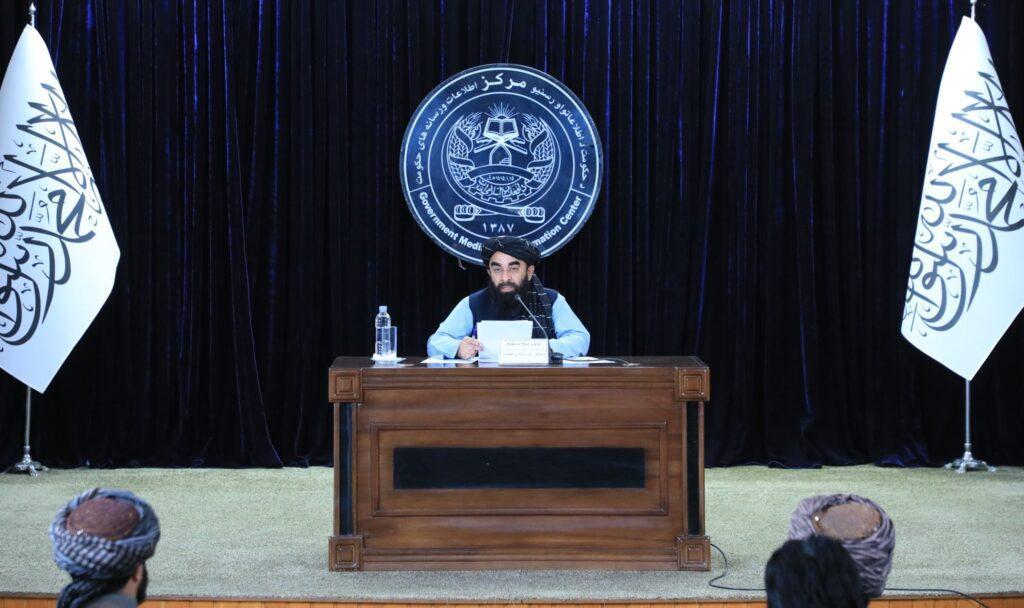
Mujahid: Pakistan Should Expel Or Hand Over ISIS-K Leader, Affiliates
KABUL (Pajhwok): The Islamic Emirate of Afghanistan (IEA) on Sunday said a ruling faction within Pakistan's military was spreading propaganda against the Afghan government because it could not tolerate Afghanistan's progress and stability.
Addressing reporters in Kabul, IEA chief spokesman Zabihullah Mujahid said the certain group was deliberately instigating conflicts along the Durand Line and attempting to undermine the positive developments in Afghanistan's security and governance.
According to Mujahid, the same faction has ignored the presence of ISIS hideouts within Pakistan's territory and has sabotaged all logical and reasonable efforts aimed at resolving the country's security challenges.
He emphasized that these actions were part of a broader agenda to destabilize regional peace and divert attention from Pakistan's internal problems.
Mujahid stated that the situation along all official borders and the Durand Line was under the IEA's full control and that illegal activities had largely been curtailed.
He said the Ministry of National Defense was using all available resources to strengthen operational coverage along the borders and the Durand Line.
According to him, Afghanistan's overall security situation is stable, with no major threats, and the country has witnessed no significant political or security incidents in the past eight months.
“Previously, any major or minor attacks organized and carried out from centers of sedition near Afghanistan's borders were either neutralized or their perpetrators killed by the grace of Allah,” he said.
“Some malicious circles have, over the past few weeks, tried to confuse the minds of the Afghan people and create fear by spreading rumors and propaganda.”
Mujahid urged Afghans not to believe in such rumors, stressing that the Islamic Emirate maintains constructive relations and dialogue with regional and international countries in accordance with Islamic Sharia.
He said the IEA prioritizes negotiations and consensus in resolving issues and has achieved significant progress in this regard.
He also underlined that Afghanistan's security and stability are now widely recognized as essential for regional and global peace.
The spokesman noted that certain circles in neighboring countries appear displeased with Afghanistan's improving security and political, economic, and social progress, and have therefore turned to conspiracies.
“This particular group is a ruling faction within Pakistan's military,” Mujahid said.“We are confident that most Pakistani military personnel, politicians, parties, religious scholars, and the general public do not agree with the anti-Afghanistan policies of this faction and are themselves frustrated by its arbitrary and dictatorial actions.”
According to Mujahid, the group spreads propaganda against Afghanistan and the IEA on international platforms, seeks to sow anxiety, spread negative narratives, and produce false information to mislead other countries.
He said most of this misinformation is aimed at creating security concerns within Afghanistan and that spreading it has become a commercial enterprise for the group.
Mujahid accused the faction of trying to create distance and hatred between the Afghan and Pakistani peoples and of attempting to damage the perception of the IEA among Pakistan's religious public while blaming Afghanistan for Pakistan's own security problems.
“This group has sabotaged all logical and reasonable efforts to resolve Pakistan's security challenges,” he added.“They pursue a specific agenda and do not want the region to be free from violence and conflict.”
He further said that the remaining tribal refugees in Afghanistan had migrated due to the mismanagement and violence caused by this group in Pakistan's tribal areas.“The Islamic Emirate warmly welcomes all efforts that would help these refugees return to their homes,” he added.
Mujahid accused the same group of exploiting differences among Afghans to recruit and use them against Afghanistan's national security by spreading false ideologies.
“At this crucial time when Afghanistan is experiencing political and economic progress, this group is instigating conflicts along the Durand Line, violating Afghan airspace, and conducting bombings near the border,” Mujahid said.
“Fortunately, every time, a decisive response has been given. It should be clear that Afghanistan has the right to defend its land and airspace, and any aggression will not go unanswered.”
He alleged that Pakistan's ruling faction has turned a blind eye to ISIS's presence and hideouts within its own territory, which endanger Pakistan's religious scholars and citizens, as well as Afghanistan's and the world's security.
“When Afghanistan was under occupation, the emergence of ISIS in the eastern provinces originated from the Orakzai region across the Durand Line in Pakistan,” he said.“A Pakistani named Saeed Khan led the group, and hundreds of individuals from various Pakistani provinces were involved.”
Mujahid said that while the Mujahideen were fighting foreign occupiers, they also battled this insurgent faction, which aimed to defame Islam and Jihad.
After the IEA's came to power, he said, the Mujahideen continued operations and cleared Afghanistan of ISIS presence. The remaining members fled to Khyber Pakhtunkhwa and Balochistan, where they established new hideouts, recruited fighters from various countries, and transported them through Pakistan's western border and airports in Karachi and Islamabad for training in extremist ideology and violent operations.
He said reliable intelligence indicates that the attacks in Tehran during Sardar Soleimani's anniversary and the Moscow attack were planned, organized, and executed from these centers, and the relevant countries are aware of it.
Mujahid claimed that many deadly attacks in Afghanistan-including those targeting religious scholars, IEA officials, Mujahideen, and civilians-were also planned and coordinated from these same bases.
He cited as examples attacks on Sheikh Rahimullah Haqqani in Kabul, Sheikh Mujibur Rahman Ansari in Herat, several Sufi mosques and khanqahs, Shia places of worship in Herat, Ghor, and Kabul, Hindu temples in Kabul, Afghanistan Bank branches in Kandahar and Kunduz, Ministry of Foreign Affairs employees, Balkh Governor Haji Mazammil, Minister of Refugees Haji Khalil-ur-Rahman Haqqani, and other officials in Nimroz and Badakhshan provinces. Other incidents included attacks on a Chinese hotel and the Russian Embassy in Kabul, foreign tourists in Bamyan, and Chinese citizens in Takhar.
Mujahid said that in February 2025, local militants carried out an attack on ISIS hideouts in Mastung, Balochistan, killing up to 30 ISIS militants, including some foreign nationals holding European passports.“These individuals were trained there and later sent abroad to conduct attacks,” he alleged.
He added that intelligence suggests this“insurgent group” is reorganizing in those areas and planning new attacks both inside and outside Afghanistan, possibly using citizens of other countries instead of Tajik nationals to avoid exposure.
“According to our information, ISIS-K leader Shahab al-Muhajir and his close associates Abdul Hakim Touhidi, Sultan Aziz Azzam, and Salahuddin Rajab-who liaises with ISIS central command-are currently hiding in Pakistan,” he stated.
Mujahid urged Pakistan to either hand over these individuals to the Islamic Emirate or expel them from its territory, saying that doing so would demonstrate Pakistan's responsibility and commitment.
He also called on Pakistan to end its negative behavior, airspace violations, and other provocative actions against Afghanistan, warning that continued aggression would have“very negative and undesirable consequences.”
According to Afghan officials, on Thursday night Pakistan carried out airstrikes on Marghi Bazaar in Paktika province's Bermal district, violating Kabul's airspace, and explosions were heard in the capital.
In response, Afghan forces launched retaliatory attacks on Saturday night against Pakistani posts along the Durand Line in Kandahar, Helmand, Zabul, Nangarhar, Paktia, Paktika, and Khost provinces.
Mujahid said Afghan forces captured 20 Pakistani posts, killing 58 Pakistani soldiers and wounding around 30 others.“Up to nine of our Mujahideen were martyred and 16–18 wounded, and we seized their weapons and equipment,” he added.
He noted that the IEA halted these operations late Saturday at the request of Qatar and Saudi Arabia.
However, he added that on Sunday morning, Pakistani forces again opened fire on Afghan positions in some areas, reigniting the conflict.
sa/ma

Legal Disclaimer:
MENAFN provides the
information “as is” without warranty of any kind. We do not accept
any responsibility or liability for the accuracy, content, images,
videos, licenses, completeness, legality, or reliability of the information
contained in this article. If you have any complaints or copyright
issues related to this article, kindly contact the provider above.


















Comments
No comment